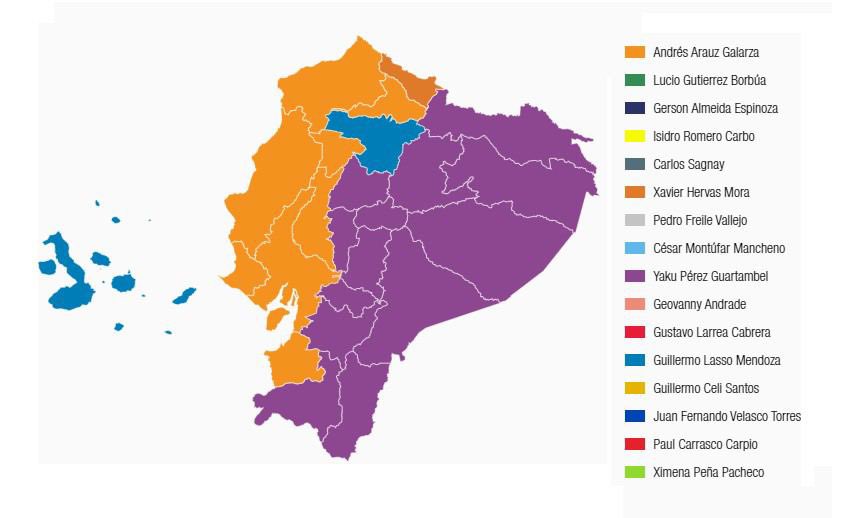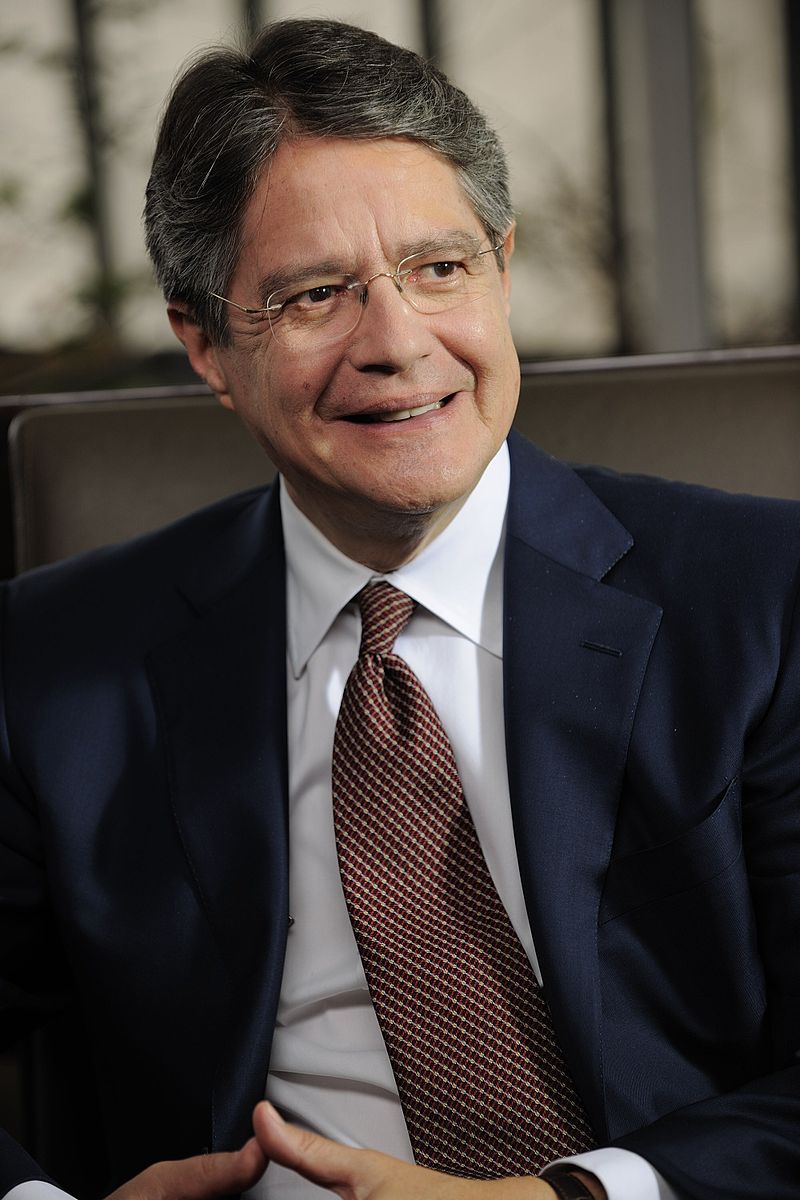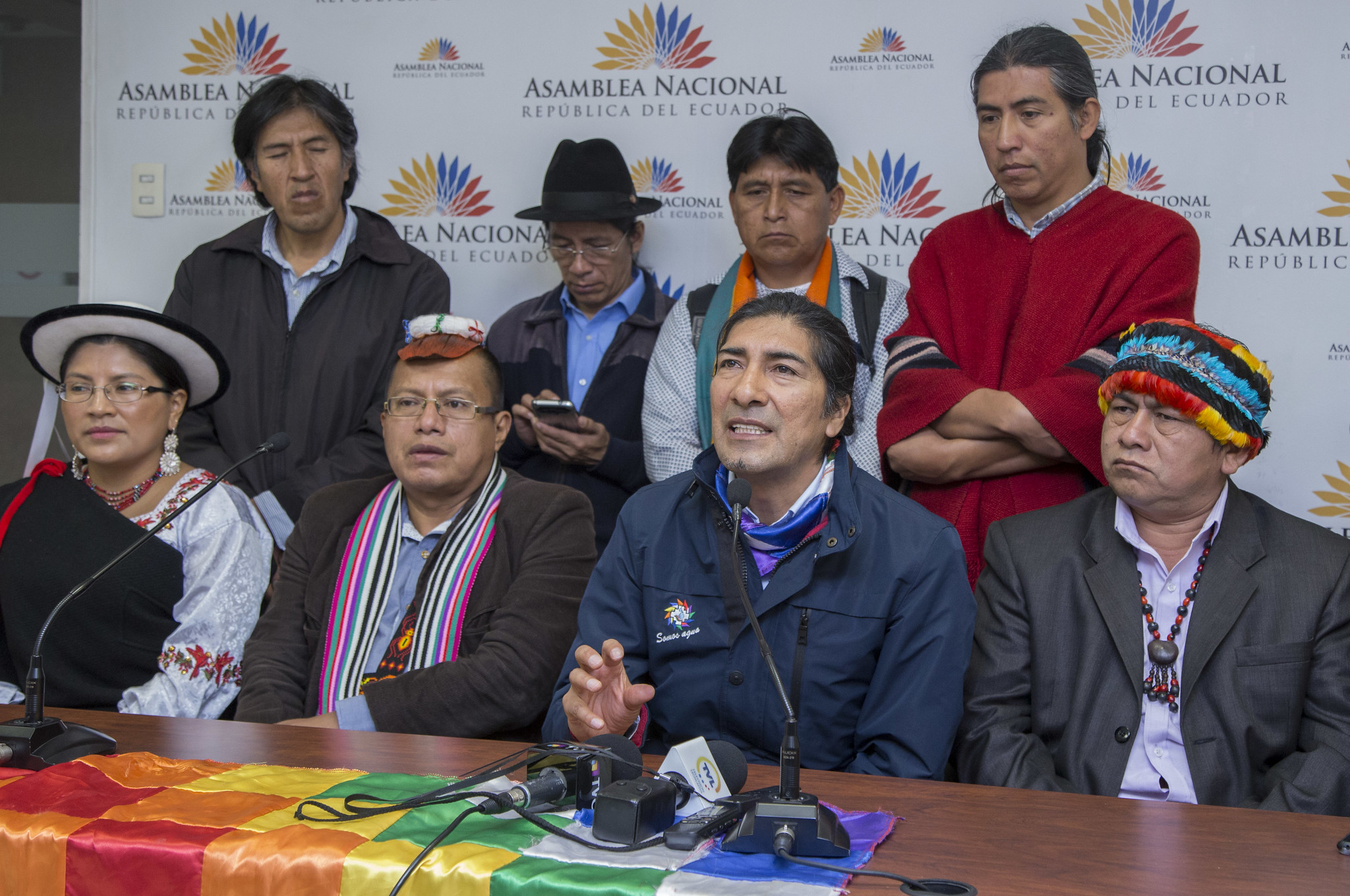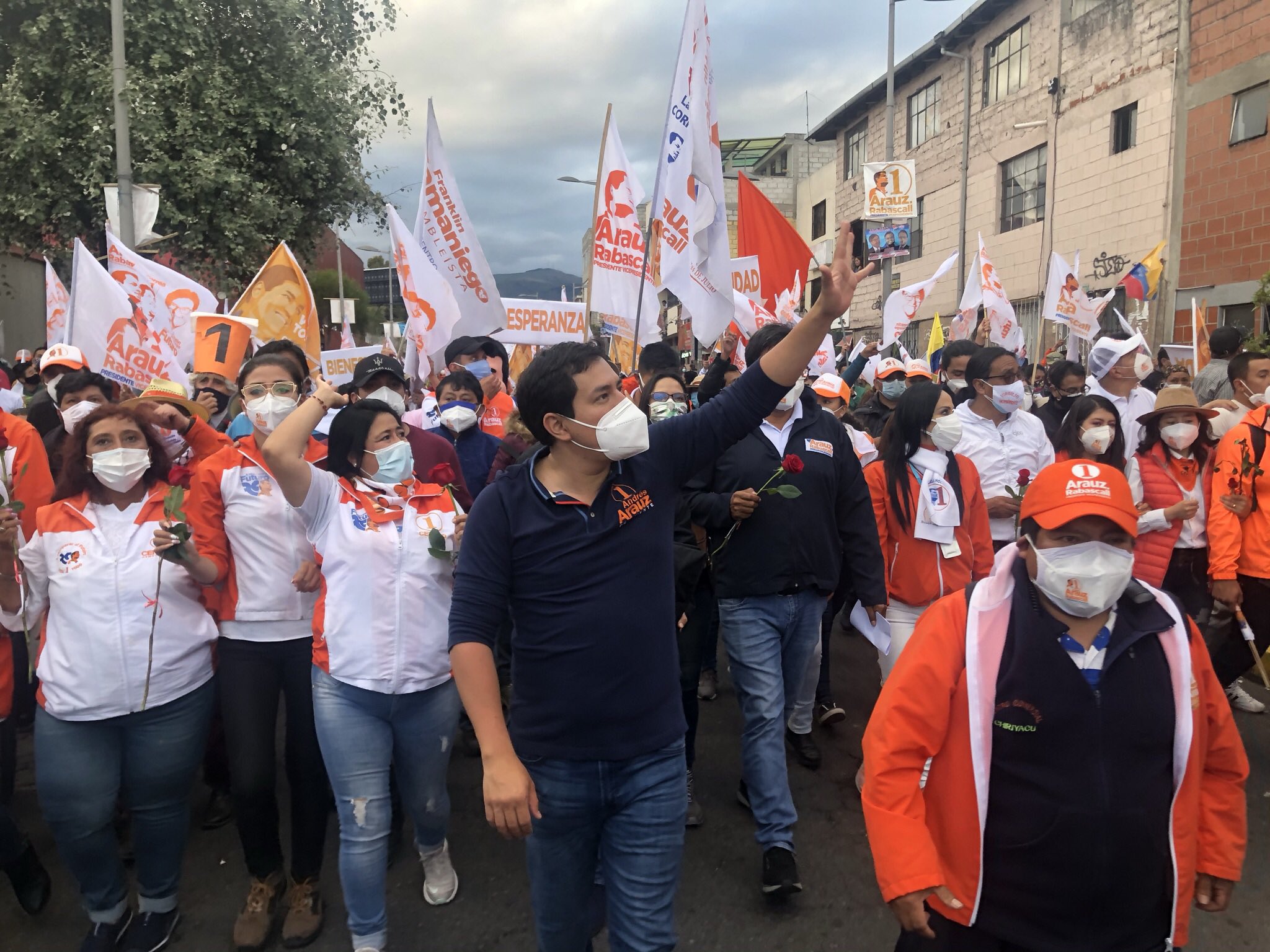The Ecuadorian election on 7 February produced a clear victory for the left-wing candidate Andrés Arauz, but not enough to prevent a second round. There is a very close tie for the second position between the capitalist oligarchy’s preferred candidate Guillermo Lasso and the “indigenous” candidate Yaku Perez.
The first thing to highlight about the elections in Ecuador was the very high turnout of over 81 percent, the same as in 2017, despite the impact of the Covid-19 pandemic, which has ravaged the South American country. Clearly, for millions of people, something important was at stake. As we have explained, these presidential and national assembly elections take place in the aftermath of the October 2019 uprising against the government of Lenin Moreno and his package of IMF-imposed austerity measures against the working class.
Lenin Moreno had been elected in 2017 in a very contested election, at a time when he was officially standing as Rafael Correa’s continuity candidate. However, after defeating the candidate of the capitalist oligarchy, the banker Lasso, Lenin Moreno proceeded very quickly to ditch the policies of social reforms and opposition to US imperialism. He made an agreement with the US, which was sealed by handing over Julian Assange, who had been given asylum in the Ecuadorian embassy in London.
Having won on the basis of the votes of the masses of workers and peasants, who decisively rejected the pro-capitalist policies represented by Lasso, Moreno proceeded to implement the policies of his defeated rival. That process culminated in an agreement with the IMF and the introduction of a brutal package of cuts against the working class, which led to the insurrectionary uprising of October 2019. The government had to flee the capital Quito and the masses ruled the streets.
That movement could have culminated in the overthrow of Moreno and the taking of power by workers and peasants. However, the leaders of the movement, particularly the CONAIE organisation of indigenous peoples, betrayed the struggle, reaching a partial deal with the government that put an end to the movement and saved Lenin Moreno from being overthrown. Of course, when the masses were removed from the streets by the agreement, then the government went on to the offensive, jailing some of the leaders and introducing through the back door the same measures which the masses had opposed.
These elections were therefore seen as an opportunity to strike a blow against the oligarchy and to get rid of the anti-worker policies implemented. That is what was driving the vote for Arauz, who was standing under the Unión por la Esperanza (Union for Hope) - UNES slate. He received over 32 percent of the vote, which was 13 percentage points over his closest rival. Arauz managed to win a clear majority in all of the coastal provinces, including a resounding 41 percent in Guayas, which concentrates about a fourth of the country’s population. This is three points more than Lenin Moreno got in Guayas in 2017.
It is worth highlighting that Ximena Peña Pacheco, the candidate of Moreno’s party, got a derisory 1.54 percent of the vote, reflecting the enormous discrediting of the current government.

Race for second place
In second position there was a very close contest between the banker Lasso and the so-called “left” and “indigenous” candidate Yaku Perez, both polling just over 19 percent each. For Lasso, this was a very bad result. In 2017 he received 28 percent of the vote in the first round, to which we would have to add the 16 percent of the votes received by the PSC candidate at the time, a party which now backs Lasso. This was a clear blow against the right wing and the ruling class, whose main open candidate might not even make it to the second round. Lasso only managed to win Pichincha, the province that includes the capital Quito, and here his victory was narrow, with only 25 percent of the vote, and winning only one of the four electoral districts.
 The banker Guillermo Lasso is the open candidate of the oligarchy / Image: Mabel Velástegui
The banker Guillermo Lasso is the open candidate of the oligarchy / Image: Mabel Velástegui
Yaku Pérez, the Pachakutik candidate, won in all of the Andean and Amazonic provinces, where the indigenous population is concentrated. In some quarters, he is regarded as a left and environmentalist candidate, but his record shows otherwise. In 2017, he openly sided with the candidate of the ruling class, Lasso, in the second round, against Lenin Moreno, who at that time represented Rafael Correa’s Citizen’s Revolution. At that time, Carlos Pérez (who had not yet changed his name to the indigenous Yaku) said: “I prefer the banker to the dictatorship”.
It is clear that there were mistakes made during the Correa government that helped alienate sectors of the indigenous population. However, the extreme sectarianism of the leadership of Pachakutik against correismo led them straight into the arms of the ruling class. This also led them to betray the movement in October 2019, as they feared that overthrowing Lenin Moreno would open the door to Correa coming back to power. They preferred leaving Moreno, who had his hands soaked in the blood of the movement’s martyrs, in Carondelet, the presidential palace. Yaku participated in the October Uprising, but was also the first to offer a public image of reconciliation with the Moreno government immediately afterwards, breaking ranks with the rest of CONAIE.
While Moreno was in power, Pachakutik consistently voted to back him in parliament and collaborated in all of his initiatives against Correa’s Citizen’s Revolution. The haste with which Yaku Perez rose up to become a presidential candidate provoked tensions within the indigenous movement, both in Pachakutik, the political party, and in CONAIE, the mass movement.
Behind a facade of environmental and indigenous rights protection measures, Perez’s main economic proposal is to abolish the tax on repatriation of hard currency, a measure that the ruling class demands. It is clear that Yaku Perez does not pose a threat to the ruling class. In fact Hervás, the candidate of Izquierda Democrática (a party which, despite its name, is neither left nor democratic) who came fourth with a surprising 15 percent, proposed a three-way alliance in the second round between himself, Lasso and Yaku in order to “prevent the return of the corrupt, populist far left” (referring to Arauz). Lasso was quick to accept, replying: “yes, this is the way forward. We must unite and support whichever democratic option goes to the second round”. While Yaku has not openly accepted, as the open support of Lasso would undermine his chances in the second round, he has also not rejected such an alliance. Instead, he is trying to position himself as the candidate best positioned to beat Arauz. When he says this, he is clearly addressing himself to the ruling class.
At the beginning of the count, it seemed that it was Lasso who was edging ahead of Yaku to go to the second round. Clearly, it would be easier for Arauz to beat the hated and discredited Lasso, the open representative of the ruling class, rather than Yaku, who has a sizable base of support amongst the indigenous population. As the count progressed it was Yaku who was ahead of Lasso, but always within a very narrow margin of less than half a percentage point, no more than 20,000 votes.
Then, on Wednesday, the tables turned again, with Lasso coming slightly ahead of his rival. Yaku immediately proceeded to allege fraud was underway to deny him a place in the second round and called for mobilisations. He went as far as accusing Correa of being behind the fraud.
That is a preposterous allegation. First of all, Correa is in Belgium and has little to no control over anything that happens in Ecuador, where he has been convicted for corruption (on trumped-up charges). The existing powers of the state (judiciary, legislative, electoral) are all against him. The current electoral authorities (CNE) were elected in 2018 and are led by a president who is a member of CONAIE, the other members belong to the parties of Lasso and outgoing president Moreno. If anything, Yaku is the one who has an influence in the CNE. Furthermore, those in power would actually prefer Yaku to go to the second round as he, with his "left-wing" and "indigenous" credentials, is better positioned to beat Arauz than the open candidate of the oligarchy, Lasso.
There is a simpler explanation for Lasso's last-minute sprint in the count. A number of the election tally papers from the different polling stations were classed as disputed. These had to be double-checked. For some reason, the disputed papers from Guayas, the most populous region, which includes Guayaquil, were left to the last. Once these disputed records started to be checked, it was expected that Lasso would increase his vote relative to Yaku, as Guayas has a very low indigenous population and Yaku only came fourth with around 8 percent here.
The current situation is one where, with 99.90 percent of the votes counted, Lasso has 19.68 percent and Yaku Perez 19.48 percent. There are only 1.3 percent of tally papers left to be double-checked, so it is unlikely that this will change.
Strike a blow against the oligarchy!
A second round between Arauz and Lasso would be a clear fight between the representative of the ruling class and a left candidate. That would put Yaku Perez and Pachakutik under a lot of pressure. If they end up publicly supporting Lasso, as they did in 2017, that would discredit them amongst wide sectors of their own electorate, amongst which there are many poor and oppressed peasants in the indigenous regions.
 If Lasso moves to the second round, it will put huge pressure on the 'left indigenous' candidate Yaku / Image: Ecuadorian National Assembly
If Lasso moves to the second round, it will put huge pressure on the 'left indigenous' candidate Yaku / Image: Ecuadorian National Assembly
Arauz is by no means a revolutionary socialist, and he has never claimed to be. At best he is a social democrat, and in the last few days he has openly declared himself as such. The problem for the ruling class is two-fold. First is the fact that Arauz has promised to change the general direction of economic policy, from cuts and austerity for the workers and poor to taxing the rich and subsidies for the working people; and from a close subordination to US imperialism to an alliance with China. Second is that for the masses of workers and poor, Arauz represents a chance to strike a blow against the capitalist oligarchy and they expect him, if elected, to deliver.
This is why the ruling class is clear: they will back any candidate bar Arauz. An editorial statement in El Telégrafo was very clear in demanding that both Yaku and Lasso come together: “we must all unite because we have a common enemy”. That “enemy” is, of course, Arauz, against whom they have used all means at their disposal, from a disgusting media campaign, to the power of the judiciary and the electoral council. These attacks will only increase in the second round.
Meanwhile, the Moreno government, in its last days in office, is hurrying legislation “to protect dollarisation” of the country’s economy, including a law to ensure the “independence” of the Central Bank. He wants to ensure the ruling class maintains key levers of institutional economic power even if they were to lose the election.
A victory for Arauz in the second round would be a defeat for the ruling class and would have an impact beyond the borders of Ecuador. In the absence of a revolutionary alternative, the coming to power of Arauz is a necessary school the masses will have to go through. In the context of a deep economic crisis, in Ecuador, and in world capitalism generally, the programme of reforms Correa was able to implement during his presidency are now ruled out.
The urgent task in Ecuador, beyond the election, is to build a revolutionary leadership. It is necessary to draw all the lessons from the October 2019 uprising and more generally from the revolutionary history of the Ecuadorian workers and peasants in the last 20 years. Their heroic struggle has overthrown governments and defeated coup attempts. For 20 years, the ruling class has never been able to elect a president from its own parties. But still, after 20 years of struggle, the problems of the masses remain the same: unemployment, mass migration, millions living under the poverty line, the unequal distribution of land, the constant imperialist interference into national affairs and the insulting chasm between the rich and the poor.
Arauz and Correa blame “neoliberalism” for the ills afflicting the masses, but in reality, these are down to capitalism. Within the limits of capitalism in crisis, in a country dominated by imperialism, there is no solution. It is not enough to talk about socialism. Socialism means the expropriation of the multinationals and the oligarchy, and the workers and peasants coming to power. A successful revolution in Ecuador would find a massive echo across the continent. It is imperative that, the next time the youth, the workers and peasants rise up they have a leadership up to the task of leading them to taking their future into their own hands.

